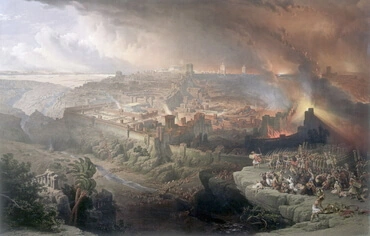1
And it was thus afterwards, that David smote the Philistines, and humbled them, and David took Metheg-ammah out of the hand of the Philistines.
2
And he smote Moab, and measured them with a cord, making them lie··down on the earth; and he measured with two cords to put··to··death, and the fulness of a cord to keep··alive. And Moab became to David for servants, bearing a gift··offering.
3
And David smote Hadadezer the son of Rehob, king of Zobah, when he went to turn··back his hand at the River*.
4
And David captured from him a thousand and seven hundred horsemen, and twenty thousand men◦ on··foot, and David hamstrung all the chariot horses, but he left remaining of them a hundred chariots.
5
And Syria of Damascus came to help Hadadezer king of Zobah, and David smote in Syria twenty and two thousand men◦.
6
And David set garrisons in Syria of Damascus, and Syria became servants to David bearing gift··offerings. And Jehovah saved David, wherever he went◦.
7
And David took the shields◦ of gold that were with the servants of Hadadezer, and brought them to Jerusalem.
8
And from Betah, and from Berothai, cities of Hadadezer, king David took exceedingly multiplied bronze.
9
And Toi king of Ḥamath heard that David had smitten all the host of Hadadezer.
10
And Toi sent Joram his son unto▵ King David, to ask after his peace and to bless him, because he had fought against◦ Hadadezer. For Toi was a man◦ of war to Hadadezer. And in his hand there were vessels of silver, and vessels of gold, and vessels of bronze.
11
These also King David sanctified to Jehovah with the silver and the gold which he sanctified from all the nations that he had subdued,
12
from Syria, and from Moab, and from the sons of Ammon, and from the Philistines, and from Amalek, and from the spoil of Hadadezer, son of Rehob, the king of Zobah.
13
And David made a name for himself when he returned from his smiting Syria in the ravine of salt, eighteen thousand.
14
And he set garrisons in Edom; in all Edom he set garrisons; and all of Edom became servants to David. And Jehovah saved David wherever he went◦.
15
And David reigned over all Israel; and it was, that David did judgment and justice to all his people.
16
And Joab the son of Zeruiah was over the army; and Jehoshaphat the son of Ahilud was recorder;
17
and Zadok the son of Ahitub, and Ahimelech the son of Abiathar were the priests; and Seraiah was the scribe;
18
and Benaiah◦ the son of Jehoiada had both the Cherethites and the Pelethites; and the sons of David were priests.







